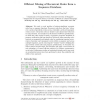Free Online Productivity Tools
i2Speak
i2Symbol
i2OCR
iTex2Img
iWeb2Print
iWeb2Shot
i2Type
iPdf2Split
iPdf2Merge
i2Bopomofo
i2Arabic
i2Style
i2Image
i2PDF
iLatex2Rtf
Sci2ools
126
click to vote
DASFAA
2008
IEEE
2008
IEEE
Efficient Mining of Recurrent Rules from a Sequence Database
We study a novel problem of mining significant recurrent rules from a sequence database. Recurrent rules have the form "whenever a series of precedent events occurs, eventually a series of consequent events occurs". Recurrent rules are intuitive and characterize behaviors in many domains. An example is in the domain of software specifications, in which the rules capture a family of program properties beneficial to program verification and bug detection. Recurrent rules generalize existing work on sequential and episode rules by considering repeated occurrences of premise and consequent events within a sequence and across multiple sequences, and by removing the "window" barrier. Bridging the gap between mined rules and program specifications, we formalize our rules in linear temporal logic. We introduce and apply a novel notion of rule redundancy to ensure efficient mining of a compact representative set of rules. Performance studies on benchmark datasets and a case ...
Related Content
| Added | 19 Oct 2010 |
| Updated | 19 Oct 2010 |
| Type | Conference |
| Year | 2008 |
| Where | DASFAA |
| Authors | David Lo, Siau-Cheng Khoo, Chao Liu 0001 |
Comments (0)

